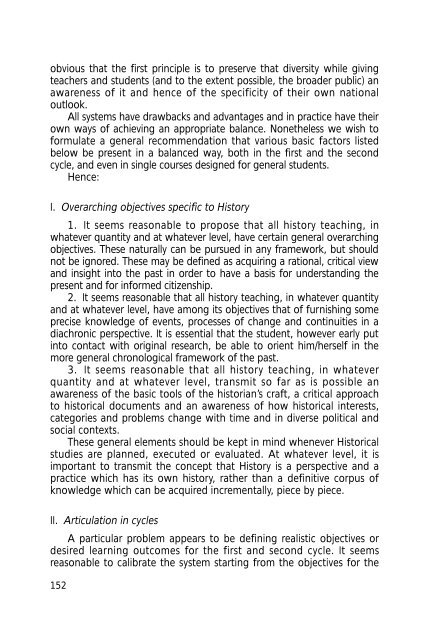Final Report Pilot Project - Relaciones Internacionales de la ...
Final Report Pilot Project - Relaciones Internacionales de la ...
Final Report Pilot Project - Relaciones Internacionales de la ...
You also want an ePaper? Increase the reach of your titles
YUMPU automatically turns print PDFs into web optimized ePapers that Google loves.
obvious that the first principle is to preserve that diversity while giving<br />
teachers and stu<strong>de</strong>nts (and to the extent possible, the broa<strong>de</strong>r public) an<br />
awareness of it and hence of the specificity of their own national<br />
outlook.<br />
All systems have drawbacks and advantages and in practice have their<br />
own ways of achieving an appropriate ba<strong>la</strong>nce. Nonetheless we wish to<br />
formu<strong>la</strong>te a general recommendation that various basic factors listed<br />
below be present in a ba<strong>la</strong>nced way, both in the first and the second<br />
cycle, and even in single courses <strong>de</strong>signed for general stu<strong>de</strong>nts.<br />
Hence:<br />
I. Overarching objectives specific to History<br />
1. It seems reasonable to propose that all history teaching, in<br />
whatever quantity and at whatever level, have certain general overarching<br />
objectives. These naturally can be pursued in any framework, but should<br />
not be ignored. These may be <strong>de</strong>fined as acquiring a rational, critical view<br />
and insight into the past in or<strong>de</strong>r to have a basis for un<strong>de</strong>rstanding the<br />
present and for informed citizenship.<br />
2. It seems reasonable that all history teaching, in whatever quantity<br />
and at whatever level, have among its objectives that of furnishing some<br />
precise knowledge of events, processes of change and continuities in a<br />
diachronic perspective. It is essential that the stu<strong>de</strong>nt, however early put<br />
into contact with original research, be able to orient him/herself in the<br />
more general chronological framework of the past.<br />
3. It seems reasonable that all history teaching, in whatever<br />
quantity and at whatever level, transmit so far as is possible an<br />
awareness of the basic tools of the historian’s craft, a critical approach<br />
to historical documents and an awareness of how historical interests,<br />
categories and problems change with time and in diverse political and<br />
social contexts.<br />
These general elements should be kept in mind whenever Historical<br />
studies are p<strong>la</strong>nned, executed or evaluated. At whatever level, it is<br />
important to transmit the concept that History is a perspective and a<br />
practice which has its own history, rather than a <strong>de</strong>finitive corpus of<br />
knowledge which can be acquired incrementally, piece by piece.<br />
II. Articu<strong>la</strong>tion in cycles<br />
A particu<strong>la</strong>r problem appears to be <strong>de</strong>fining realistic objectives or<br />
<strong>de</strong>sired learning outcomes for the first and second cycle. It seems<br />
reasonable to calibrate the system starting from the objectives for the<br />
152


